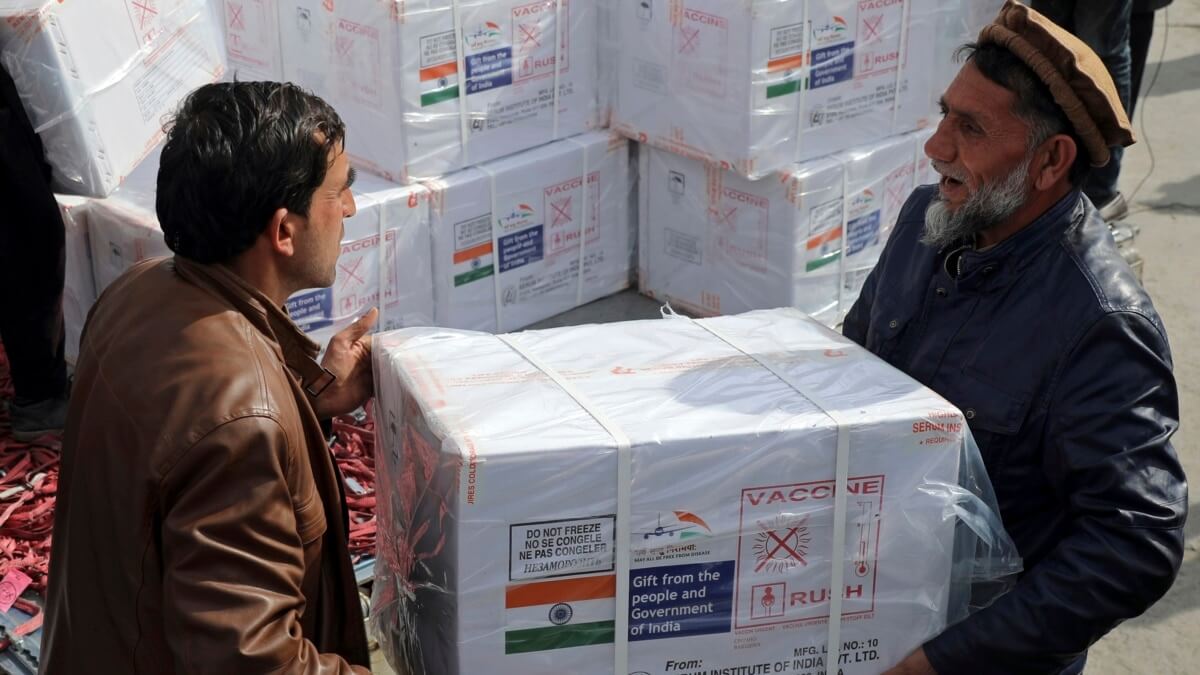During the first visit by Indian officials to Afghanistan since the Taliban’s takeover last August, Ministry of External Affairs (MEA) officials said the resumption of infrastructure projects and trade is dependent on the Taliban ensuring that Afghan soil is not used by Pakistani terror groups. The visit has fuelled speculation about New Delhi reopening its diplomatic mission in Kabul despite not recognising the Taliban’s regime.
According to a release by the Indian MEA, however, the visit largely aimed to oversee the delivery of humanitarian aid to Afghanistan. The team also met with representatives of several international organisations. However, the MEA has refused to provide details on the composition of the delegation, the duration of the visit, and exact itinerary, citing concerns about the security situation in Afghanistan.
#BREAKING: First high-level meeting in Afghanistan between India and Taliban after Kabul fell. Taliban’s Foreign Minister of Islamic Emirate Amir Khan Muttaqi meets India’s Ministry of External Affairs senior diplomat JS PAI JP Singh in Kabul. pic.twitter.com/BMS3EeJrUN
— Aditya Raj Kaul (@AdityaRajKaul) June 2, 2022
The statement said that in light of the humanitarian crisis in Afghanistan, India has thus far provided 20,000 metric tonnes of wheat, 12 tonnes of medicines, 500,000 doses of COVID-19 vaccines, and winter clothing. These were previously delivered to the Indira Gandhi Children Hospital in Kabul and other United Nations-led agencies such as the World Health Organisation and the World Food Programme. Additionally, India has delivered 60 million polio vaccines and two tonnes of other essential medicines through UNICEF.
India has also delivered one million doses of the COVAXIN jab to Iran for Afghan refugees in the country. The MEA further declared that India would continue to provide Afghanistan with food and essential medicines. In this regard, the Indian team will conduct meetings with Taliban leaders to discuss the continued delivery of humanitarian aid.
Since the Taliban’s takeover, India has been the largest donor to Afghanistan, with over $3 billion in aid.
The delegation, headed by Joint Secretary JP Singh, will also visit India-funded projects and programmes, including the Chimtala electricity sub-station near Kabul. India has previously completed several infrastructure projects in Afghanistan, including the Parliament building, the 218-kilometre long Zaranj-Delaram highway, and the $290 million Friendship Dam.
it would not interfere in Afghanistan’s domestic affairs. DFM Stanekzai assured the Indian delegation that the Afghan-Indian relations would move forward based on mutual respect & joint bilateral legitimate interests, & would not be influenced by other countries’ inter-rivalry.
— Abdul Qahar Balkhi (@QaharBalkhi) June 2, 2022
In this regard, Taliban Foreign Minister Amir Khan Muttaqi expressed his hope to Singh that India would resume its development projects in Afghanistan. Other Taliban representatives also urged India to consider reviving trade with Afghanistan.
According to the Deccan Chronicle, the MEA officials said the revival of such engagements is dependent on the Taliban ensuring that Afghan soil is not used by Pakistani terror groups like the Jaish-e-Mohammed and the Lashkar-e-Taiba to conduct terrorist activities against India.
Singh also met with Deputy Foreign Minister Sher Abbas Stanekzai. Taking to Twitter, Foreign Ministry spokesperson Abdul Qahar Balkhi said the pair discussed the “historic” ties between India and Afghanistan. He also highlighted the need for Indian assistance in humanitarian aid and infrastructural development. Meanwhile, the Indian official reiterated New Delhi’s “non-intervention policy” and reassured that India would not interfere in Afghanistan’s personal affairs.
Afghanistan’s priorities with infrastructural & small projects, capacity building, educational scholarships & humanitarian aid.
— Abdul Qahar Balkhi (@QaharBalkhi) June 2, 2022
Welcoming the Indian delegation to Kabul, DFM Stanekzai thanked the Indian government for its humanitarian aid & assured the Indian side that
The visit has provided a push to growing speculation about India resuming its embassy in Afghanistan. In fact, in an exclusive interview with CNN-News 18, Amir Khan Muttaqi said that the group is keen to strengthen relations with India and expressed hope that it would reopen its embassy in Kabul, for which he vowed to pay “special attention” to “ensure its safety.”
On being asked about the reports, MEA spokesperson Arindam Bagchi urged against “reading too much into the visit.” However, he highlighted that despite all Indian officials being repatriated since the Taliban’s take over, several local staff continue to function and maintain the diplomatic mission in Kabul.
Furthermore, Afghanistan’s mission in New Delhi, led by Ambassador Farid Mamundzay, also remains functional. The embassy was set up by former President Ashraf Ghani, who was forced to flee Afghanistan after the Taliban took over.
The MEA officials’ meeting is the first since the Taliban took over Kabul in August, following which India has followed the international community in refusing to formally recognise the Taliban’s regime. There is no indication about a change in India’s position on this issue.
There was also no mention about a resumption of construction on the TAPI natural gas pipeline, a project that brings together Turkmenistan, Afghanistan, Pakistan, and India. The Pakistani ambassador to Afghanistan claimed this week that all four partners are ready to resume development, but India has yet to comment on the matter.

